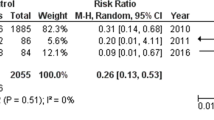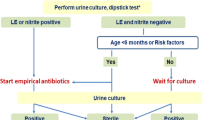Abstract
Triple therapy including clarithromycin, amoxicillin, and a proton pump inhibitor (PPI) has been recommended as the treatment of choice for Helicobacter pylori eradication. This regimen is now challenged by an increasing level of clarithromycin resistance that jeopardizes the treatment success. When clarithromycin resistance has been detected, or when its rate is known to be high in the geographic area, this drug cannot be used. It can be replaced by metronidazole, the resistance of which has a limited clinical relevance. Another option is to prescribe tetracycline and metronidazole with a PPI or ranitidine bismuth citrate. New antibiotics such as levofloxacin or rifabutin can also be used in combination with amoxicillin and a PPI. Probiotics can be added to all of these regimens to improve compliance by decreasing adverse events. But some authors advocate a quadruple therapy as a first-line treatment. Solutions to improve the limitations of this last regimen are now being proposed. Clarification of the controversial treatment indications such as gastroesophageal reflux disease or prevention of nonsteroidal anti-inflammatory drug gastroduodenal symptoms has been made. The question of prevention of gastric carcinoma by H. pylori eradication remains unanswered.
Similar content being viewed by others
References and Recommended Reading
Marshall BJ, Warren JR: Unidentified curved bacilli in the stomach of patients with gastritis and peptic ulceration. Lancet 1984, 1:1311–1315.
European Helicobacter pylori Study Group: Current European concepts in the management of Helicobacter pylori infection. The Maastricht consensus report. Gut 1997, 41:8–13.
The report of the Digestive Health Initiative International Update on Helicobacter pylori. Gastroenterology 1997, 113:S4–S5.
Lam SK, Talley NJ: Report of the 1997 Asia Pacific Consensus Conference on the management of Helicobacter pylori infection. J Gastroenterol Hepatol 1998, 13:1–12.
Hunt RH, Fallone CA, Thomson ABR: Canadian Helicobacter pylori Consensus Conference update: infections in adults. Can J Gastroenterol 1999, 13:213–217.
Coelho LG, Leon-Barua R, Quigley EMM, and representatives of theLatin-American National Gastroenterological Societies affiliated with the Inter-American Association of Gastroenterology (AIGE): Latin-American consensus conference on Helicobacter pylori infection. Am J Gastroenterol 2000, 95:2688–2691.
Malfertheiner P, Mégraud F, O’Morain C, et al.: Current concepts in the management of Helicobacter pylori infection-The Maastricht 2-2000 Consensus Report. Aliment Pharmacol Ther 2002, 16:167–180.
Mégraud F, Lamouliatte H: Review article: the treatment of refractory Helicobacter pylori infection. Aliment Pharmacol Ther 2003, 17:1333–1343.
Mégraud F: H. pylori antibiotic resistance: prevalence, importance, and advances in testing. Gut 2004, 53:1374–1384.
Broutet N, Tchamgoue S, Pereira E, et al.: Risk factors for failure of Helicobacter pylori therapy--results of an individual data analysis of 2,751 patients. Aliment Pharmacol Ther 2003, 17:99–109.
Kist M, Glocker E, Wolf B, Heep M: Resi Net--A nationwide German sentinel study on development and risk factors of antimicrobial resistance in Helicobacter pylori. Helicobacter 2003, 8:465.
Delchier JC, Roudot-Thoraval F, Courillon-Mallet A, et al.: Traitement de l’infection à Helicobacter pylori en pratique courante: résultats d’une enquête multicentrique national. La Lettre de l’Infectiologue 2001, 3(Suppl):34.
Wermeille J, Cunningham M, Dederding JP, et al.: Echec de l’éradication d’Helicobacter pylori: l’observance est-elle la principale cause? Gastroenterol Clin Biol 2002, 26:216–219.
Oléastro M, Ménard A, Santos A, et al.: Real-time PCR assay for rapid and accurate detection of point mutations conferring resistance to clarithromycin in Helicobacter pylori. J Clin Microbiol 2003, 41:397–402.
Schabereiter-Gurtner C, Hirschl AM, Dragosics B, et al.: Novel real-time PCR assay for detection of Helicobacter pylori infection and simultaneous clarithromycin susceptibility testing of stool and biopsy specimens. J Clin Microbiol 2004, 42:4512–4518.
Neri M, Milano A, Laterza F, et al.: Role of antibiotic sensitivity testing before first-line Helicobacter pylori eradication treatments. Aliment Pharmacol Ther 2003, 18:821–827.
Romano M, Iovene MR, Montella F, et al.: Pretreatment antimicrobial-susceptibility testing in the eradication of H. pylori infection. Am J Gastroenterol 2000, 95:3317–3318.
Toracchio S, Cellini L, Di Campli E, et al.: Role of antimicrobial susceptibility testing on efficacy of triple therapy in Helicobacter pylori eradication. Aliment Pharmacol Ther 2000, 14:1639–1643.
Lamouliatte H, Mégraud F, Delchier JC, et al.: Multicentre Study Group: Second-line treatment in case of failure to eradicate Helicobacter pylori: a randomised trial comparing four treatment strategies. Aliment Pharmacol Ther 2003, 18:791–797. This is a large, multicenter study testing different strategies as second-line treatment.
Miwa H, Nagahara A, Kurosawa A, et al.: Is antimicrobial susceptibility testing necessary before second-line treatment for Helicobacter pylori infection? Aliment Pharmacol Ther 2003, 17:1545–1551.
Romano M, Marmo R, Cuomo A, et al.: Pretreatment antimicrobial susceptibility testing is cost saving in the eradication of Helicobacter pylori. Clin Gastroenterol Hepatol 2003, 1:273–278.
Ford A, Moayyedi P: How can the current strategies for Helicobacter pylori eradication therapy be improved? Can J Gastroenterol 2003, 17(Suppl B):36B-40B.
Calvet X, Garcia N, Lopez T, et al.: A meta-analysis of short versus long therapy with a proton pump inhibitor, clarithromycin and either metronidazole or amoxycillin for treating Helicobacter pylori infection. Aliment Pharmacol Ther 2000, 14:603–609.
Vergara M, Vallve M, Gisbert JP, Calvet X: Meta-analysis: comparative efficacy of different proton-pump inhibitors in triple therapy for Helicobacter pylori eradication. Aliment Pharmacol Ther 2003, 18:647–654.
Altintas E, Sezgin O, Ulu O, et al.: Maastricht II treatment scheme and efficacy of different proton pump inhibitors in eradicating Helicobacter pylori. World J Gastroenterol 2004, 10:1656–1658.
Nagahara A, Miwa H, Kawabe M, et al.: Second-line treatment for Helicobacter pylori infection in Japan: proton pump inhibitor-based amoxicillin and metronidazole regimen. J Gastroenterol 2004, 39:1051–1055.
Chaudhary A, Ahuja V, Bal CS, et al.: Rank order of success favors longer duration of imidazole-based therapy for Helicobacter pylori in duodenal ulcer disease: a randomized pilot study. Helicobacter 2004, 9:124–129.
Realdi G, Dore MP, Piana A, et al.: Pretreatment antibiotic resistance in Helicobacter pylori infection: results of three randomized controlled studies. Helicobacter 1999, 4:106–112.
Calvet X, Montserrat A, Guell M, et al.: Ranitidine-bismuth citrate, tetracycline and metronidazole followed by triple therapy as alternative strategy for Helicobacter pylori treatment: a pilot study. Eur J Gastroenterol Hepatol 2004, 16:987–990.
Lamarque D, Tankovic J, Berrhouma A, et al.: Triple therapy using ciprofloxacin for eradication of clarithromycin and metronidazole-resistant Helicobacter pylori. Gut 1997, 41:A104.
Cammarota G, Cianci R, Cannizzaro O, et al.: Efficacy of two one-week rabeprazole/levofloxacin-based triple therapies for Helicobacter pylori infection. Aliment Pharmacol Ther 2000, 14:1339–1343. This is the first study that successfully used a new fluoroquinolone as an alternative to clarithromycin.
Miehlke S, Madisch A, Bästlein E, et al.: One-week triple therapy with esomeprazole, levofloxacin and amoxicillin is effective for eradication of Helicobacter pylori sensitive to metronidazole and/or clarithromycin. Helicobacter 2003, 8:464.
Bilardi C, Dulbecco P, Zentilin P, et al.: A 10-day levofloxacin -based therapy in patients with resistant Helicobacter pylori infection: a controlled trial. Clin Gastroenterol Hepatol 2004, 2:997–1002.
Birac C, Bouchard S, Camou C, et al.: Six year follow-up of resistance to antibiotics of Helicobacter pylori in Bordeaux, France. Gut 1999, 45(Suppl 3):A107.
Cabrita J, Oleastro M, Matos R, et al.: Features and trends in Helicobacter pylori antibiotic resistance in Lisbon area, Portugal (1990–1999). J Antimicrob Chemother 2000, 46:1029–1031.
Perri F, Festa V, Clemente R, et al.: Rifabutin-based “rescue therapy” for Helicobacter pylori infected patients after failure of standard regimens. Aliment Pharmacol Ther 2000, 14:311–316.
Bock H, Koop H, Lehn N, Heep M: Rifabutin-based triple therapy after failure of Helicobacter pylori eradication treatment: preliminary experience. J Clin Gastroenterol 2000, 31:222–225.
Gisbert JP, Calvet X, Bujanda L, et al.: “Rescue” therapy with rifabutin after multiple Helicobacter pylori treatment failures. Helicobacter 2003, 8:90–94.
Roghani HS, Massarrat S, Shirekhoda M, Butorab Z: Effect of different doses of furazolidone with amoxicillin and omeprazole on eradication of Helicobacter pylori. J Gastroenterol Hepatol 2003, 18:778–782.
Wong WM, Wong BC, Lu H, et al.: One-week omeprazole, furazolidone and amoxicillin rescue therapy after failure of Helicobacter pylori eradication with standard triple therapies. Aliment Pharmacol Ther 2002, 16:793–798.
Sakamoto I, Igarashi M, Kimura K, et al.: Suppressive effect of Lactobacillus gasseri OLL 2716 (LG21) on Helicobacter pylori infection in humans. J Antimicrob Chemother 2001, 47:709–710.
Nista EC, Candelli M, Cremonini F, et al.: Bacillus clausii therapy to reduce side-effects of anti-Helicobacter pylori treatment: randomized, double-blind, placebo controlled trial. Aliment Pharmacol Ther 2004, 20:1181–1188.
Fischbach LA, Zanten SV, Dickason J: Meta-analysis: the efficacy, adverse events, and adherence related to first-line anti-Helicobacter pylori quadruple therapies. Aliment Pharmacol Ther 2004, 20:1071–1082.
Graham DY, Belson G, Abudayyeh S, et al.: Twice daily (mid-day and evening) quadruple therapy for H. pylori infection in the United States. Dig Liver Dis 2004, 36:384–387.
O’Morain C, Borody T, Farley A, et al.: Efficacy and safety of single-triple capsules of bismuth biskalcitrate, metronidazole and tetracycline, given with omeprazole, for the eradication of Helicobacter pylori: an international multicentre study. Aliment Pharmacol Ther 2003, 17:415–420.
Laine L, Hunt R, El-Zimaity H, et al.: Bismuth-based quadruple therapy using a single capsule of bismuth biskalcitrate, metronidazole, and tetracycline given with omeprazole versus omeprazole, amoxicillin, and clarithromycin for eradication of Helicobacter pylori in duodenal ulcer patients: a prospective, randomized, multicenter, North American trial. Am J Gastroenterol 2003, 98:562–567.
Ford AC, Delaney BC, Forman D, Moayyedi P: Eradication therapy in Helicobacter pylori positive peptic ulcer disease: systematic review and economic analysis. Am J Gastroenterol 2004, 99:1833–1855. This is an important meta-analysis comparing the consequences of H. pylori eradication on PUD healing and prevention of recurrence after 1 or 2 years.
Malfertheiner P: Helicobacter pylori eradication does not exacerbate gastro-oesophageal reflux disease. Gut 2004, 53:312–313.
Axon AT: Personal view: to treat or not to treat? Helicobacter pylori and gastro-oesophageal reflux disease—an alternative hypothesis. Aliment Pharmacol Ther 2004, 19:253–261.
Hunt RH, Bazzoli F: Review article: Should NSAID/low-dose aspirin takers be tested routinely for H. pylori infection and treated if positive? Implications for primary risk of ulcer and ulcer relapse after initial healing.Aliment Pharmacol Ther 2004, 19(Suppl 1):9–16.
Wong BC, Lam SK, Wong WM, et al.: Helicobacter pylori eradication to prevent gastric cancer in a high-risk region of China: a randomized controlled trial. JAMA 2004, 291:187–194. This is the first study of the prevention of gastric cancer by H. pylori eradication in the general population with gastric cancer as the outcome.
Hunt RH: Will eradication of Helicobacter pylori infection influence the risk of gastric cancer? Am J Med2004, 117(Suppl 5A):86S-91S.
Author information
Authors and Affiliations
Rights and permissions
About this article
Cite this article
Mégraud, F. Update on therapeutic options for Helicobacter pylori-related diseases. Curr Infect Dis Rep 7, 115–120 (2005). https://doi.org/10.1007/s11908-005-0071-4
Issue Date:
DOI: https://doi.org/10.1007/s11908-005-0071-4




